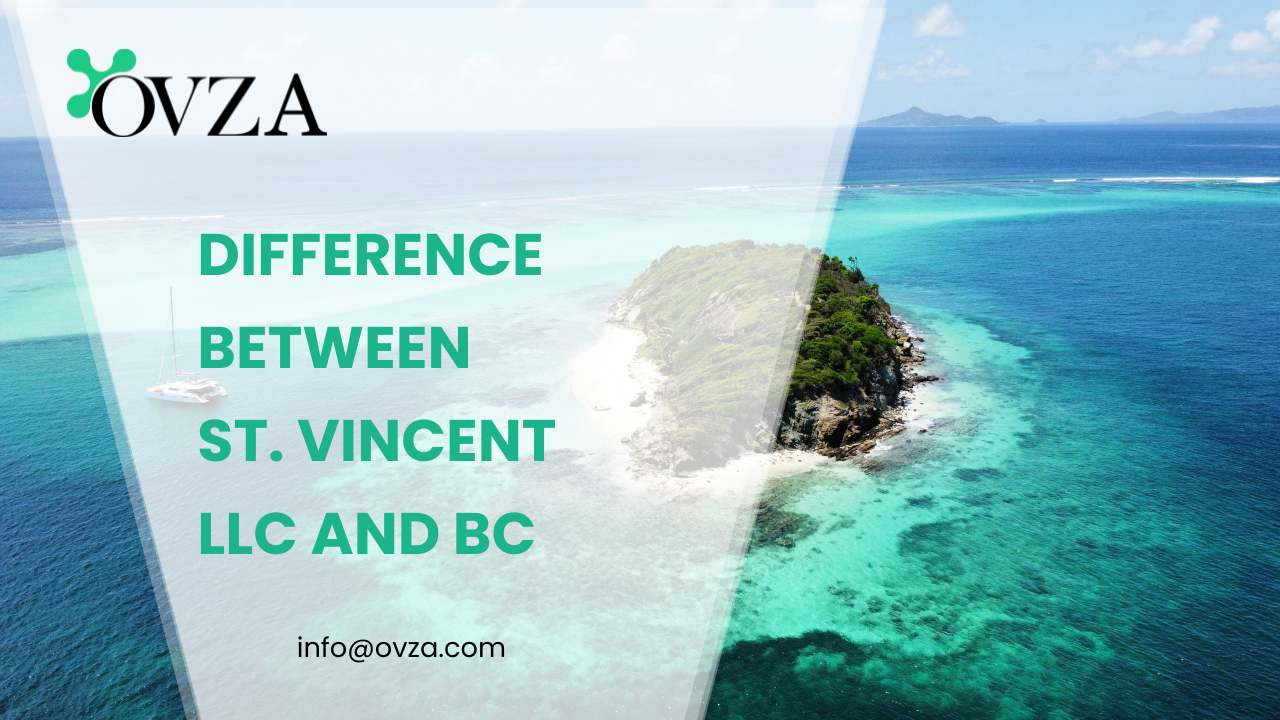The difference between a St. Vincent LLC and BC starts with the end of the IBC era, which once defined the jurisdiction’s offshore financial industry. For decades, the International Business Company—commonly referred to as an IBC—stood at the center of St. Vincent’s offshore financial services sector. Favored by foreign investors, wealth managers, and international entrepreneurs, the St. Vincent IBC offered what was once considered the gold standard of offshore structuring: full exemption from local taxes, complete privacy, no audit or reporting obligations, and a fast, affordable incorporation process. But in 2019, St. Vincent and the Grenadines formally repealed the IBC Act, ending the legal existence of the IBC framework and launching a new era in its place.
The shift was not voluntary. Global regulatory bodies, including the European Union and the Organisation for Economic Co-operation and Development (OECD), had long criticized the IBC model as a vehicle for tax evasion, profit shifting, and financial opacity. As part of a coordinated push for transparency and tax reform, jurisdictions like St. Vincent were forced to either abandon the IBC model or face blacklisting, loss of correspondent banking relationships, and reputational damage. In response, the government of St. Vincent enacted sweeping reforms that repealed the IBC legislation and introduced two compliant alternatives: the Business Company (BC) and the Limited Liability Company (LLC).
Legal Status of St. Vincent IBCs Post-2019
As of January 1, 2019, it is no longer possible to incorporate a St. Vincent IBC. Existing IBCs were given a transitional period to either dissolve or migrate into one of the new structures—BC or LLC—depending on their operational needs and legal preferences. Companies that failed to make the transition were struck off the register. The International Business Companies (Repeal and Consolidation) Act effectively nullified the IBC as a legal entity, and any references to IBCs in St. Vincent today are either historical or misleading.
It is important to clarify that the St. Vincent Business Company (BC) is not simply a rebranded IBC. Although many of the procedures and features overlap with the former regime—such as allowance for foreign ownership and relatively simple formation requirements—the BC is governed by a completely different legal framework. BCs are now subject to a 30% corporate tax rate on income earned within St. Vincent. However, where all income is derived from outside the jurisdiction and the company maintains no local business presence, exemptions or effective zero-tax outcomes may still apply. Additionally, BCs must maintain accounting records and meet basic compliance obligations in line with global standards.
Structural Differences Between the IBC and the BC
The most striking difference between the St. Vincent IBC and the modern BC lies in legal compliance and international legitimacy. Under the old IBC model, companies were prohibited from conducting business within St. Vincent, were not taxed on foreign income, and enjoyed near-total anonymity. No annual returns were required, and ownership information was never disclosed, even to the registrar. This level of privacy—though attractive to many—became the central reason for international scrutiny.
In contrast, the St. Vincent BC is a fully compliant corporate entity recognized under international legal frameworks. BCs are permitted to trade both domestically and internationally. While the 30% tax rate technically applies, companies operating exclusively offshore and without local income may not incur actual tax liability, provided they are structured carefully. Most importantly, the BC requires the maintenance of accounting records and, in some cases, reporting obligations—marking a significant departure from the zero-compliance environment of the former IBC.
Legal Structure and Governance
The difference between a St. Vincent LLC and BC starts with their legal identities. A St. Vincent Business Company (BC) is a traditional corporate entity formed under the Business Companies Act. It is structured with shareholders, directors, and a constitutional framework that resembles a standard international corporation. By contrast, the St. Vincent LLC, also known as an SVG LLC, is a separate legal vehicle introduced under its own statute. It is modeled after the U.S. LLC and is considered a more modern, contract-based business entity.
In practical terms, a St. Vincent BC operates with a corporate hierarchy. Shareholders appoint directors, directors manage the company, and internal decisions are made through board resolutions. This setup suits companies seeking to maintain a formal structure with multiple stakeholders or compliance reporting needs. On the other hand, a St. Vincent LLC is designed for flexibility. It does not require directors or a share structure. Instead, members can manage the company directly, and governance is guided by a private operating agreement rather than statutory obligations. This simplicity makes the SVG LLC appealing to solo entrepreneurs, offshore holding structures, and family-owned entities.
Below is a chart that compares the features of SVG LLCs and SVG BCs:
Here’s a side-by-side comparison:
| Feature | St. Vincent LLC (SVG LLC) | St. Vincent Business Company (BC) |
|---|---|---|
| Legal Basis | Governed by the St. Vincent LLC Act | Governed by the Business Companies Act |
| Ownership Structure | Members (no shares issued) | Shareholders (shares issued) |
| Management | Managed by members or managers (flexible) | Managed by directors (formal corporate structure) |
| Liability Protection | Yes, limited liability for members | Yes, limited liability for shareholders |
| Tax Treatment | Pass-through (no local tax on foreign income) | 30% corporate tax (foreign income may be exempt) |
| Privacy | High privacy—no public register of members | High privacy—no public register of shareholders/directors |
| Corporate Formalities | Minimal—no annual meetings, no share register | Moderate—must maintain share register and board resolutions |
| Accounting Requirements | Must maintain internal records (not filed) | Must maintain internal records (not filed) |
| Use Cases | Asset protection, single-owner companies, flexible structures | Trading company, holding assets, more formal corporate use |
| International Perception | Compliant with OECD/EU standards | Compliant with OECD/EU standards |
| Annual Filing | None required | None required |
| Bank Account Compatibility | Widely accepted by offshore banks | Widely accepted by offshore banks |
Tax Treatment
Another key difference between a St. Vincent LLC and BC lies in how each entity is taxed and maintained. By default, a St. Vincent BC is subject to a corporate income tax of 30%. However, this tax may not apply if the BC earns its income entirely outside of St. Vincent and meets certain regulatory conditions. In such cases, the BC can still operate as a near-zero-tax vehicle, particularly when no local operations or banking are involved.
In contrast, the St. Vincent LLC is often treated as tax-transparent. This means the LLC itself is not taxed in St. Vincent; instead, profits are passed through to the members, who report them according to their personal tax obligations in their country of residence. For international clients in no- or low-tax jurisdictions, this can be a strategic advantage. The SVG LLC structure is especially useful for consultants, asset-holding entities, and foreign entrepreneurs who want to avoid double taxation.
Both the BC and LLC must maintain a registered agent and keep internal accounting records. However, the St. Vincent LLC offers reduced administrative burden. There are no requirements to hold annual general meetings or maintain shareholder registers, and the internal records are typically simpler. For clients seeking minimal upkeep while maintaining legal standing in an internationally recognized jurisdiction, the SVG LLC continues to stand out as a low-maintenance alternative.
Conclusion
The difference between a St. Vincent LLC and a St. Vincent BC is more than just structural—it reflects a strategic choice between flexibility and formality, between contract-based governance and traditional corporate architecture. Both entities offer strong privacy protections, international legitimacy, and the ability to operate free of local taxation when structured properly. However, the SVG LLC is often favored for its ease of use, reduced compliance burden, and adaptability to various offshore business models. The St. Vincent BC, while slightly more formal, may be better suited to clients who require a share-based structure or who anticipate working with jurisdictions that are more familiar with traditional corporate setups.
As St. Vincent and the Grenadines continues to position itself as a compliant and respected offshore jurisdiction, understanding these distinctions is essential for anyone forming a company in the region. Whether you are seeking tax efficiency, asset protection, or international operations, selecting the right entity—St. Vincent LLC or BC—will determine how effective, efficient, and future-proof your offshore structure will be.












